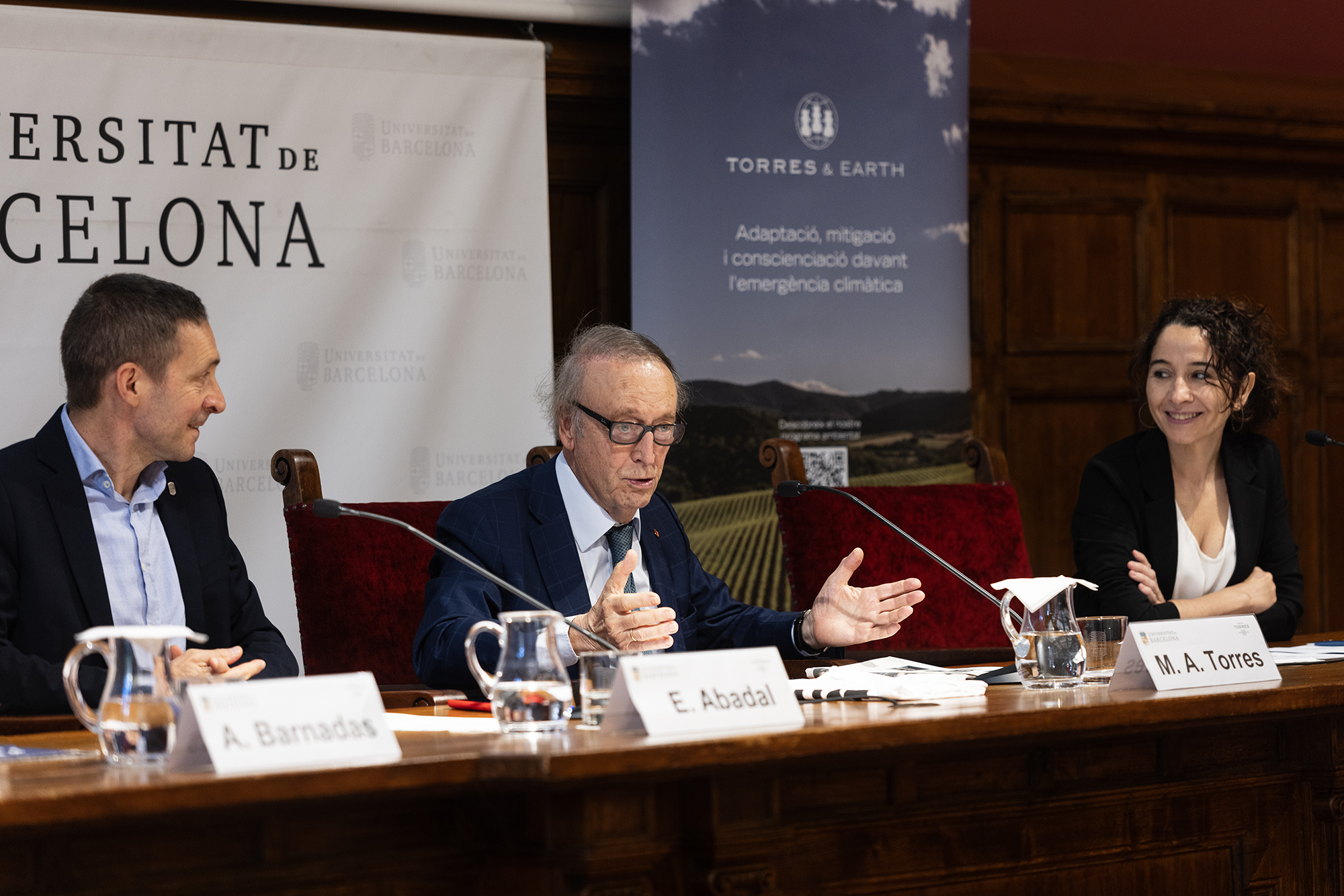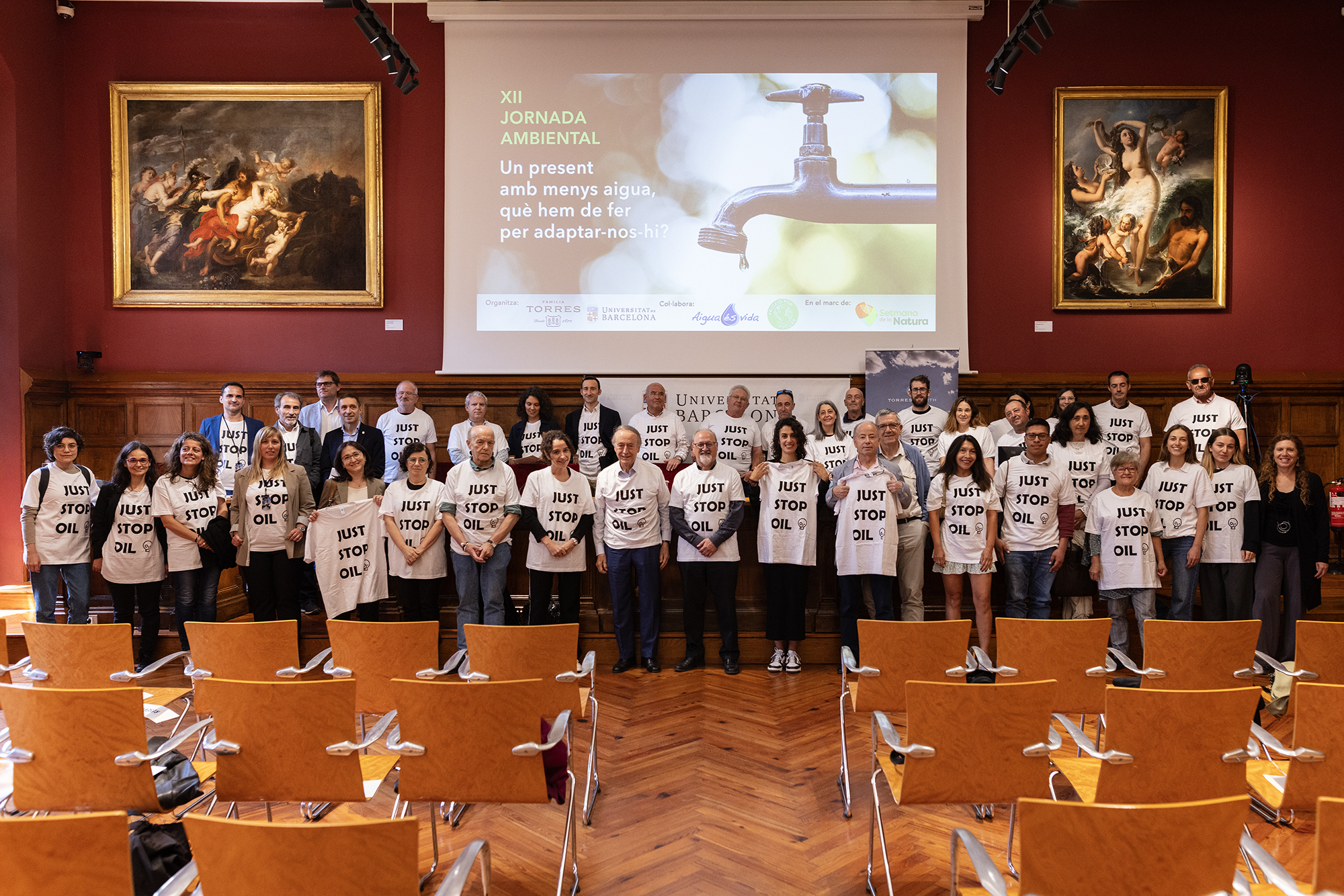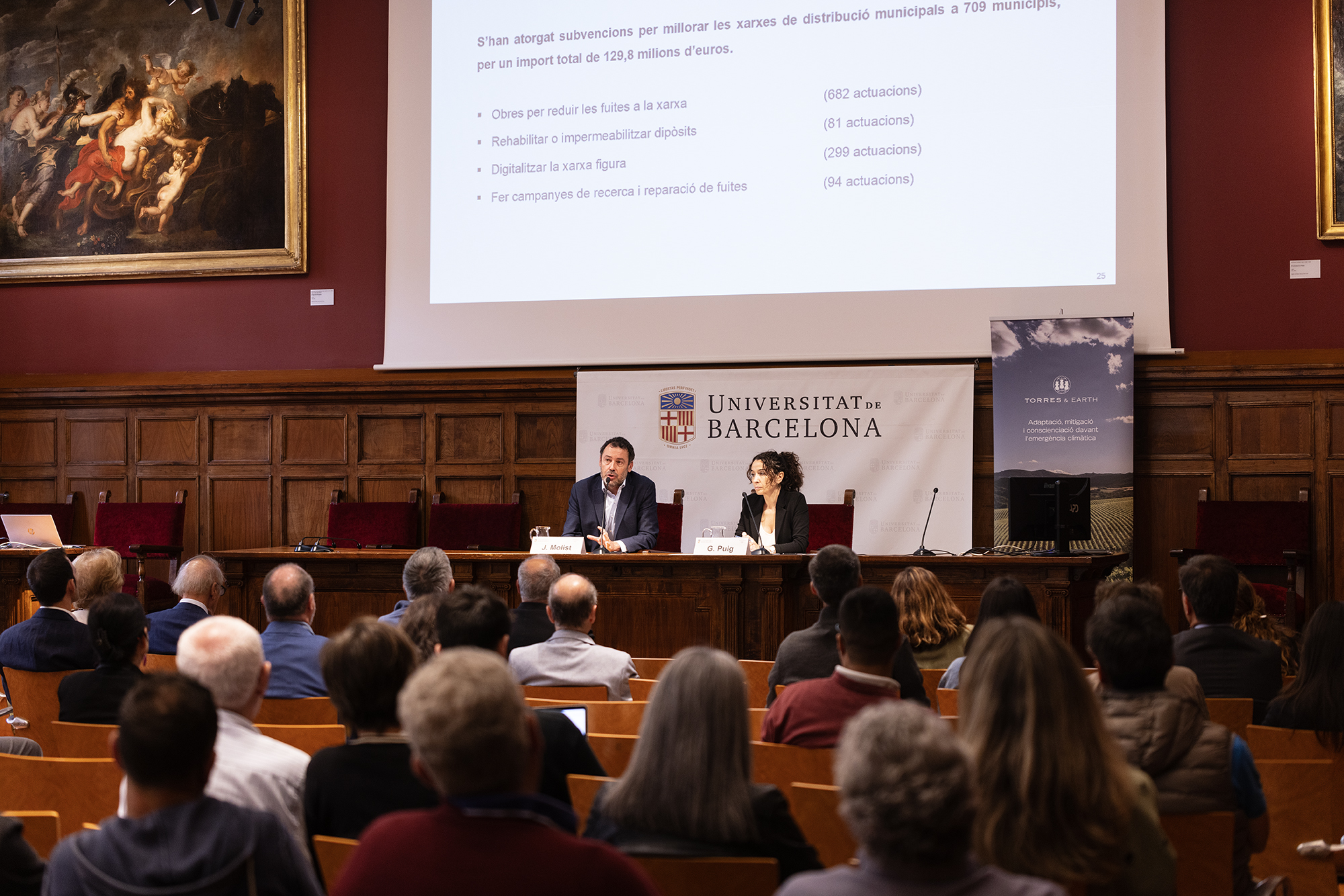The adaptation to water scarcity and sustainable management strategies have been the focus of the 12th Environmental Conference, held on 27th May at the University of Barcelona (UB). Organised by this institution and Familia Torres under the title ‘A present with less water, what must we do to adapt?’, it brought together specialists, activists and politicians who debated the water crisis and how we can manage it to ensure a better future.
At the opening of the event, the Secretary for Climate Action, Food and Rural Agenda of the Generalitat de Catalunya, Anna Barnadas, explained that we are in “the longest and most intense drought period” in history and that this is directly related to climate change. Despite the severity of the situation, “we are still in time to rectify many dynamics”, she said, noting that a drastic reduction in consumption and an increase in the efficiency of the use of this resource are necessary. This message was reiterated by the event’s host and TV meteorologist Gemma Puig, saying that we need to be “more sustainable” and “more efficient” to reduce the impact of droughts and that we must continue working because the situation will not improve in the future.
Miguel A. Torres, President of Familia Torres, reminded that drought is a consequence of the “one hundred million barrels of oil” we consume every day. In Penedès, last year, approximately 50% of grape production was lost due to drought, a “very serious” situation that is not exceptional. Torres advocated “a future without oil and without plastics”, which he directly related to drought and global warming, and with pollution and health. Ernest Abadal, the university’s Vice-Rector, closed the inauguration by valuing the Environmental Day for both its 12 editions and the themes it has addressed. ‘This is a conference that wants to change things’, he concluded.
A global problem that is addressed at many levels
Elena Domene, PhD in Environmental Sciences, provided a global perspective on the problem. The change in global patterns already means that half of the world's children are exposed to high water stress. The economy is also important: the uneven distribution of scarcity leads to more costly measures of water procurement, which makes it difficult for the most vulnerable to pay for it. This also happens in the global north, where droughts can complicate access to water for people who had it guaranteed.
In Catalonia, in the last three years, it has rained half as much and the temperature has been 1ºC higher than the average for the last century, noted ACA’s Supply Director (Catalan Water Agency), Jordi Molist. A situation that has forced the establishment of restrictions and that the latest rains have not resolved. Molist recalled that the droughts of the early 2000s promoted “structural changes” such as a reduction in domestic consumption and the implementation of desalination. These have prevented “a situation of total emptying of the reservoirs” and have led to the decision to double the desalination capacity. In this sense, a similar effect has now occurred with regenerated water: its use has been accepted, slowing down the water decrease in reservoirs, and there is also a desire to increase its importance.
Another key element, he said, is efficiency in distribution. This was also highlighted by Elisenda Realp, from the Area of Climate Action and Energy Transition of the Diputació de Barcelona, and Braulio Moreno, manager of SABEMSA, the public water company of Barberà del Vallès. There are leaks in many places, with losses that can reach 40%. That is why the municipalities are working to solve the issue, with more than 1,200 planned actions and an investment of almost 130 million euros.
With “more ambition”, therefore, performance can be optimised and “water independence” achieved. Moreno presented the case of his town, where for 10 years only between 5% and 7% of water has been lost. This is the result of 40 years of efforts to supply the maximum possible population with its own resources, reinvesting the profits in renewal and improvement of the network, and minimising the losses of pipes that, as Moreno recalled, are often still made of fibrocement.
A distant example but with many similarities
Karla A. Nemeth, director of the California Department of Water Resources, has put the water problem into perspective. Through a video, she explained how there three years of drought have ended with three weeks of heavy rain. A clear example of the effects of climate change and the challenge it poses. This crisis can only be overcome with new solutions, efficiency and collaboration. These are “very complex” challenges that require working against the clock in a climatic situation very similar to that of Catalonia. This is why Nemeth stated that innovation and technology are essential, not just adapting but also optimising meteorological prediction to know where and when there will be water. Significant investments have been made in this regard.
Beyond citizens: adapting the economy
Adapting the network and reducing and optimising water use by citizens, however, cannot mitigate this problem if economic actors do not do their part. For this reason, the Environmental Conference had representatives from the agricultural and tourism sectors. Thus, Jordi Puig, PhD in Environmental Sciences and farmer, acknowledged the complexity of addressing the problem from the point of view of the country's “main water consumers”. Agriculture must adapt to climate change and reduce water demand while maintaining economic sustainability. Following the principles of regenerative agriculture, he proposed measures such as cover crops, minimum tillage, agroforestry, intercropping and the application of organic matter and micronutrients in the soil to restore soil health and make agriculture as efficient as possible with the least environmental impact.
Another sector that has been in the eye of the storm during this drought has been tourism. As a member of the Catalan Federation of Campsites, Josep M. Pla pointed out that his sector represents almost half of the country's tourist offer and that, between 1999 and 2023, consumption per family and day in Catalan campsites fell by more than 40%. He acknowledged, however, that this is not enough and that they are taking further measures: digitalisation of consumptions to optimise them, training and awareness of staff, clients and suppliers, preventive maintenance of facilities, reusing pool water for toilets, etc.
Long-term planning and the defence of people's rights
The round table ‘New vision of the future of water’ had a great point of agreement: the need for a long-term planning framework that considers science, demography, economic sectors... Marc Oliva, an engineer from the Intercollegiate Water Observatory, recalled that in the future there will be more population and less water. The environmentalist and CSIC researcher, Núria Catalán, pointed out the need for a water transition that rethinks the model. An aspect in which Mª Teresa Vadrí, professor in environmental law at the UB, and Dante Maschio, spokesperson for the Agua es Vida (Water is Life) platform, agreed on, stressing that water must be a common good and not a business, and that there is a need for coordinated public planning that separates demand forecasts from specific economic interests.
The German climate activist Luisa Neubauer spoke right after, with a speech that complemented what had just been said. When we talk about the climate emergency “it is essential”, she said, to talk about democracy. The reason is very simple: “the same people are against both things: the anti-democrats, the fascists, the deniers, the sceptics”. These two battles, she asserted, are the same and are “our duty”. To protect democracy, she concluded, is to protect climate action and a future for everyone.
XII Environmental Conference "A present with less water, what must we do to adapt?" | UBtv





